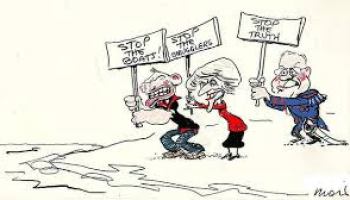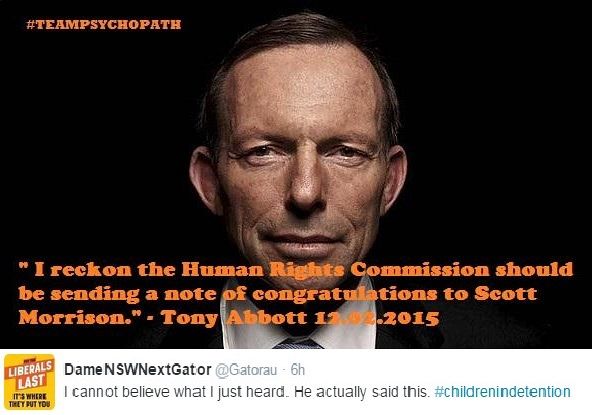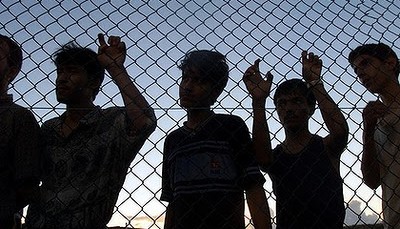Welcome to the (political) asylum.

Asylum:
- noun: refuge, sanctuary, shelter, safety, protection, security, immunity;
the protection granted by a nation to someone who has left their native country as a political refugee.
“she applied for asylum and was granted refugee status”
“we provide asylum for those too ill to care for themselves”
“he appealed for political asylum”
- dated:
an institution offering shelter and support to people who are mentally ill.
After watching last night’s Q&A I got an unexpected text from a friend.
“The numbers are only worse under Labor for children in detention
because Labor let more refugees in, right? Not that it is defendable”
the message read.
I had to give this some thought…
Yes I suppose there were more ‘irregular entries’ from 2008 onward
than there had been during the Howard years. By 2008 we were really just
starting to feel the shockwaves of a series of genocides in which
Australia had been complicit. The number of boat arrivals increased
under Labor, and with it the number of children in detention. And I
suppose a veritable tsunami of new boat arrivals from Afghanistan and
Sri Lanka also came as a supply-boom for a fledgling private prison
industry.
Australia has not dealt properly with refugees since the 1970’s.
The Fraser government achieved humanitarian outcomes for tens of
thousands of refugees from indo-china, in accordance with our
obligations under international law. Fraser, now 84, has cut ties with
his former political party and now champions the cause of refugee
advocacy. He was also the man behind the coup that took down the
Australia’s first and only autonomous government. Go figure. I’d take
Fraser for PM over any of the current crop (except perhaps Wilkie or
Wong.)
Stewart West, another octogenarian, served as Minister for
Immigration and Ethnic Affairs under Hawke. I heard West speak at rally
last year. He spoke passionately, recalling anecdotes of his work
abroad, particularly in central and south America. What echoes in my
minds ear still are these words: “In my day we didn’t have a problem
with refugees arriving by boat. We flew them here.” West resigned
shortly after Hawke introduced his policy of mandatory detention for
unauthorised arrivals. A man of integrity.
Hawke brought in mandatory detention. Keating Privatised it. Howard
offshored it. Rudd and Gillard tried to scale it back, proposing to
settle clients in “third countries”. Abbott opposed this because it was
Labor’s idea, and once in power imposed his final solution to the refugee problem by turning back the boats.
This instantly improved his polling, which was dutifully reported in
the Murdoch press and scored him countless cheap points among the
brainwashed and brainless masses.
One small problem with Abbott’s strategy is that according to every
legal entity, everywhere, seeking asylum is a human right, and
refoulement is illegal.
Australia now stands in breach of countless articles of international
law, and we haven’t actually done anything to fix the problem. We’ve
done nothing to address the plight of undocumented, homeless, stateless
people fleeing tyranny and persecution. What Abbott has done is given
billions of taxpayer dollars to corporate thugs and enlisted the armed
forces by executive order to make this someone else’s problem.
Meanwhile we have a ‘budget emergency’. I’m only crying because it hurts to laugh.
The boats have stopped coming now, or so we’re told, so I guess what
we do with the rest of the irregulars in detention now is a matter for
the Liberal party and their business interests to decide. (Tony
Shepherd, President of the Business Council of Australia, is the
former chairman of Transfield which operates the facility at Manus
Island, a U.S. styled private prison. Serco and G4S have also held
lucrative government tenders at various times to operate detention
facilities, along with Greg Sheppard, who runs the private security firm
Wilson Protective Services PNG Ltd. All Liberal Party donors.)
The reaction to the human rights commission’s report into the forgotten children
comes as no surprise. Investment by successive governments has boosted
supply in a market which now has weakeneing demand. I imagine Abbott at
this moment finds himself in quite a quandary. Clearly he hasn’t thought
the game through; else he would have announced something by now. My
guess is he probably never thought he’d get this far.
I suppose a government so committed to old world ideas about what a
‘family unit’ looks like would find the problem even more perplexing.
There are whole families in detention, we are told. In the example
reluctantly proffered by Mr Turnbull the father is a suspected security
risk, but his wife and 3 kids refuse to leave detention without him. I
shudder to think what a pallid chord the thought of broken families must
strike on Cory Bernardi and Eric Abetz’ god-fearing heart strings. One
conservative maggot troll tweeted something along the lines of “shame on
these unworthy refugees for using their children as bargaining chips.”
Meanwhile the same government which refused to spend $500m to
guarantee the future of car manufacturing in Australia and save 100 000
jobs (sorry to labour the point), are happy to hand over $2bn to the
private prison industry, which benefits the rest of us how, exactly? And
where does Labor stand on this? Or is this another matter of ‘national
security’ which has bi-partisan support?
I cringe at the thought.















